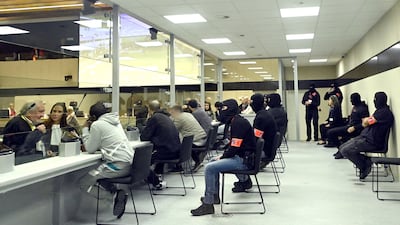Lawyers of victims of the 2016 Brussels bombing attack on Monday said they had been “taken hostage” by defendants’ repeated walkouts and protests against security measures since the opening of the trial this month.
Lawyers of four defendants - Mohamed Abrini, Sofiane Ayari, Ali El Haddad Asufi and Osama Krayem - have said they would not comply with cross-examinations, scheduled to start on Wednesday, as long as the issue of "humiliating" security measures during their transfer to court was not solved.
But Maryse Alie, defending Life4Brussels, a group of victims of the triple suicide attacks that killed 32 and injured hundreds, for which ISIS claimed responsibility, said that the situation was becoming "intolerable."
“We are taken hostage, there are threats to boycott the trial, while the people we defend have been waiting for years for it to start,” she said.
The security measures include cameras in defendants' toilets in court and strip searches before and after their transfer from their prison cell in the nearby city of Haren, to the court, in Nato’s former headquarters north of Brussels.
Defendants' lawyers on December 16 subpoenaed the Court of First Instance, requesting the Belgian state relax security measures. They will make their case on Friday and the court’s president is not expected to give an answer until next week.
Lawyer Laura Pinilla, who represents Abrini, said he would not answer questions until the issue of transfers was settled.
She told reporters it was “false” to accuse defendants of “trying to instrumentalise” the trial.
“The defence has done everything to keep this debate outside of the courtroom and was clear about the transfer problems since the first day,” she said.
Prosecutors say Abrini fled Brussels Airport in March 2016 without detonating his suitcase of explosives, unlike two of his accomplices who accompanied him to the airport.
Ms Pinilla said lawyers would discuss their next step in the event that Belgium does not relax security measures.
Lawyers of Asufi, Krayem and Ayari also said their clients would wait for a response from the civil court before deciding whether they would answer interrogations in the criminal court over the Brussels bombing.
The position of defendant Salah Abdeslam remained unclear.
After walking out last week in solidarity with other defendants complaining about security measures, Abdeslam said he had a cold and could not leave his cell.
His lawyer Delphine Pachi told The National she did not want to comment on whether he would be interrogated.
Belgian prosecutors allege that Abdeslam’s arrest in Brussels, four days before the bombings took place, impelled his accomplices to launch their attacks.
Only four defendants confirmed they would take part in cross-examination. Bilal El Makhoukhi and Herve Bayingana Muhirwa are currently detained. Brothers Smail and Ibrahim Farisi are free.
None of the four were defendants in the Paris trial.
The Belgian Justice Ministry has already told lawyers in a letter that the government is unlikely to change transfer security measures, which are not “unique to this trial”.
This argument was picked up by another victims’ lawyer, Guillaume Lys, who pointed out that the Brussels bombing trial was not the first terrorist trial with strict security measures during detainees’ transfer.
“It looks to me like some are trying to make a link between answers to questions from victims to these transfer conditions,” he said.
Previous terrorism cases in Belgium include a two-day trial in February 2018 over a shooting in a Brussels apartment in March 2016, three days before the suicide attacks, when Belgian police tried to arrest Abdeslam and Ayari.
Both men, who managed to flee, were sentenced to 20 years in prison for the shooting, during which one of their accomplices died and several Belgian police officers were wounded.
Abdeslam and Ayari were also involved in the Paris bombings in November 2015, which killed 130 people. A Paris court in June sentenced both to life imprisonment.


